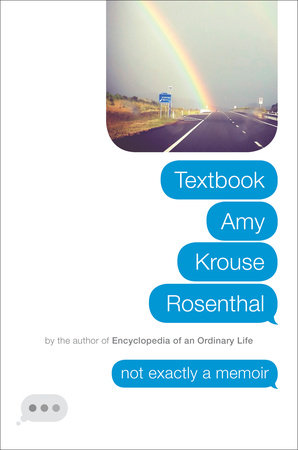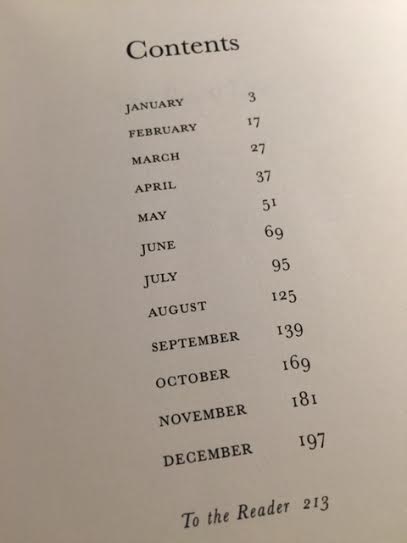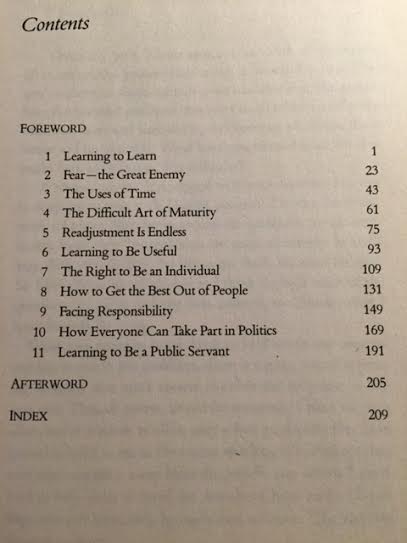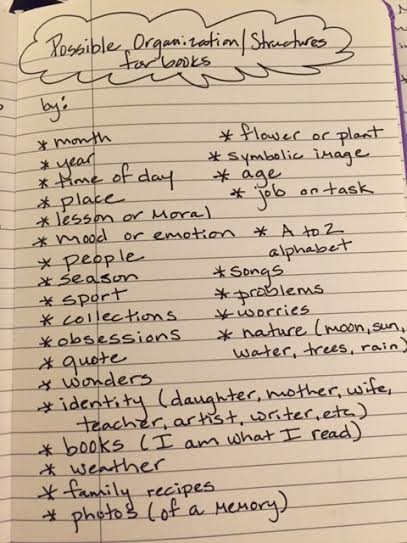I’m a little bit of a freak when it comes to keeping up with what my favorite authors are working on.
Okay. I’m more of a stalker.
Regardless. . . waiting is hard work.
But, finally . . . something is coming.
Something BIG.
Amy Krouse Rosenthal’s new book comes out next month!
The title?
Textbook Amy Krouse Rosenthal: Not Exactly A Memoir

She is genius.
I am giddy about the unique text structure she choose to write these “nonlinear reflections and insights” (Penguin Random House Publishers). Unlike most personal growth, memoir type books, Amy has organized this book by subject headings such as Social Studies, Math, Music, Language Arts, etc. The writers at Penguin Random House Publishers describe it as such:
“Not exactly a memoir, not just a collection of observations, Textbook Amy Krouse Rosenthal is an exploration into the many ways we are connected on this planet and speaks to the awe, bewilderment, and poignancy of being alive.”
How can you not rush directly to Amazon and hit that dang one-click purchase button? It’s only at the pre-order state though. It’s not coming out until August 9th. Oh, the agony!
Her previous book, The Encyclopedia of an Ordinary Life, is also her brain child organizational structure to use for writing, non fiction or not. She gathers all of her snippets of wisdom, quotes, observations, lists and documented happenings and hangs them on the framework of the encyclopedia.
I am drawn to this right now as I mine through my own notebooks digging for gems, not knowing what they will become. It’s life stuff and most of it is garbage, loads of blah, blah, blah, but there are some tidbits that I’d like to do something with. Organization is the framework of how to think about our ideas. It helps us visualize the possibilities of what our writing could be. Writing then begins to take shape.
The teacher in me also wants to use these books as mentor texts to share with students. We are required to teach our students the standard forms/genres of writing: narrative, non-fiction and persuasive. However, there are creative ways to organize writing that go beyond the 5 paragraph essay for persuasion, a basic personal narrative, or a categorical nonfiction report. Within these forms of writing, we teach how to write in chronological, compare/contrast, problem/solution and cause/effect text structures. Of course, there are a variety of plot structures for narratives, as well. All of these must be taught as they are used under the umbrella of an entire piece of work.
But, it’s the authors that go so out of the box with unique ways to organize a book that makes reading and writing exciting. When I discover a new structure, energy sizzles.
I headed to my book shelves to seek out other ideas for possible structures for my own writing gobbledy-gook. Surely, I had much to learn from right here in front of me.
Here are a few I found:
Lots of Candles, Plenty of Cake by Anna Quindlen
Anna organizes her memoir type reflections at midlife into chapters that focus on a theme such as:
stuff, girlfriends, generations, solitude, expectations, and faith
For me, these themes could each be a book, yet she is able to synthesize it all into tight chapters. This would take tons of work for me as I am more detail oriented.
Mining my own notebooks, I think I would choose topics with more specificity, such as:
popcorn, sugar, hair, pie, walking, hips and knees, Captain Morgan, coffee and dogs
Perhaps each of these could be a vignette under a larger theme or section like:
Addictions, Wisdom, Body, Soul, Heart, Mind, Marriage
This is a possibility. I love to think about what is possible.
The Rural Life by Verlyn Klinkenborg
Verlyn writes about his life in the country. By Month.

Love. Love. Love.
We live in seasons. I have realized over the years, that I go through many of the same experiences every September, just as I do in February. The book could be called, The Teaching Life, The Mother’s Life, or even The Human Life. The chapters could be narratives, poems or reflections.
Again. . . so many possibilities with this structure.
You Learn by Living by Eleanor Roosevelt
Eleanor organizes her book by important keys for living a more fulfilling life. I think about this as each chapter being a lesson learned. And, hopefully, a narrative to detail how she learned that lesson. What lessons have I learned by midlife? Are there lessons that I still need to learn? I know there are lessons I am working on every day of my life. As I scan over my pages of writing, each entry holds a lesson. Each story teaches us something about living on this Earth School and what it means to be human.
Would my book be lessons about teaching? or just stuff I’ve learned along the way?
Hmmmmm. . . .

This reminds me of Dorothy Allison’s Two or Three Things I know For Sure? Could we not write a book on what we THINK we have figured out?
I had to generate a list of possible structures as well – just to have some fun in brainstorming session.

The best teachers are other books, so I’m going to compile a good list of books to show my third graders what other authors have done to organize their books. We can then generate our own list together.
Then, we can all dwell in the possibilities of what our writing might become.
Dreamers, we are.
Shari 🙂


Love this peek inside your head! Especially the books you mentioned. I have The Rural Life, just stopped to pull it off my shelf. Love the Anna Quindlen book, requesting You Learn by Living and the Encyclopedia of an Ordinary Life (and her new one coming out soon). Thanks for this peek into all the possibilities for the structure of our own writing. And these lines:
“Then, we can all dwell in the possibilities of what our writing might become.
Dreamers, we are.”
LikeLike
Thank you for stopping by to dig into these books with me, Ramona. I can’t believe you have The Rural Life, as it seems like a book that might sit quietly on the bookstore shelves. Let me know what you think of the other books!
LikeLike
Amy Krouse Rosenthal is one of the great ones! I just recommended her as a mentor author to a teacher the other day. Her new book looks interesting.You’ll have to let us know how it is.
LikeLike
Yes, I agree with you, Stacey. Every summer I dig into one author as a mentor author and this summer it is her. I’m trying to devour as much as I can about her work. Last summer, I studied Oliver Jeffers and bought as many books of his as possible. My third graders adored everything I shared about this author and imitated his writing, too. We can never have enough mentors. 🙂
LikeLiked by 1 person
I love your reminder to check our bookshelves for help! Great exploration of possible structures. Keep going ❤
LikeLike
Our own bookshelves house so much goodness, Fran, don’t you think? 🙂
LikeLike
I have been making some attempts at organizing the SOL Slices I’ve posted in an attempt to use them in the coming school year during writer’s workshop time. My notebooks are good collections, but random. I have put “Textbook” on hold at the library. Thanks goodness they let us place a hold as soon as a book is ordered.
LikeLike
I’m interested in how you decide to structure your writing, Adrienne. There are so many possibilities and it’s kind of fun to play them all out and then choose what feels good. 🙂
LikeLike
I love peeking into your thinking! Lots to think about here, and thanks for sharing your notebook.
LikeLike
Thank you for stopping by to read my words, Rose ~ 🙂
LikeLike
I like these myriad thoughts running through you as inspired by other artists’ groupings. I am not familiar with any of the authors mentioned, but have added their names and titles to my queue and that’s always a good thing. Thanks for sharing..
LikeLike
Raivenne, so glad I could send some inspiration your way! 🙂
LikeLiked by 1 person
You have inspired me to read her encyclopedia!! I’m intrigued by what I was able to read on Amazon Preview.
LikeLike
Amye – yes those Amazon previews always hook me. And, then lead me to another. . . and another. . .
LikeLiked by 1 person
I usually make my book lists using Amazon for the same reason!
LikeLike
I love that first book of Amy’s and often use it when teaching structure. Great post thanks for sharing it in the Facebook group!!
LikeLike
Thank you, Shari! What a fun read. I love peeking into ToC of all those books. I have Amy KR’s Encyclopedia and was thinking of buying her second one, but I certainly will now. I also want to read all the other books you’ve showcased!
Seeing into your notebook was great too. I’m planning on running a SOL unit with my sevens. Maybe we can use your post to brainstorm topics.
Thank you for your beautiful site and words!
LikeLike
And this is why I can’t seem to write the books I’d like to write. The problem of structure. I manage it intuitively in smaller pieces but don’t know how to manage it in the larger project of a book. And now I’m off to the library because I don’t feel like searching my shelves for the books here that I have, and I don’t have the Quindlen at all. I have NO IDEA how I missed this post last summer. So glad to find it now! Encyclopedia is, along with House on Mango Street, the most often used mentor text in my teaching career. I never tire of it and I also had no idea she had a book published last fall. Off to purchase. And think.
LikeLike